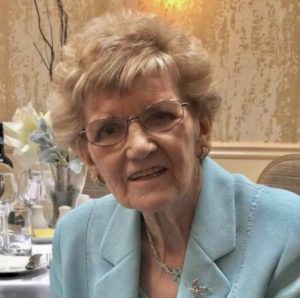
My mother, and aunts on both sides of the family, had been nurses but I opted for a two year secretarial course using my French and in the second year met my husband to be at Manchester University Scout and Guide Club.
I left my office job to start a family and was a ‘stay at home mum’ for 15 years. A return to office work only lasted a couple of years and I ‘retired’ early to look after my home and garden. In March 1982 my husband died within a day of collapsing with a brain haemorrhage; he was 49, I was 44. Within a week or two I decided that I needed to do something useful, preferably not attached to a typewriter. Three children and a dog had overcome my squeamishness and I applied to train as a nurse. Bea, the receptionist/telephonist at Yorkshire Regional Health Authority, directed me up the magnificent staircase to see the Nursing Officer, a man called St John. He sat me in a comfy armchair and asked a lot of questions. He pointed out that I would be competing with 18 year olds and advised that I should use the skills and experience I already had. He told me to keep a look out for suitable jobs in the paper, based at the RHA.
A few weeks later, the post of Administrative Assistant to the Regional Pharmaceutical Officer was advertised and I applied. The late Tom Clarke OBE offered me the job and in September 1982 I started work.
We coasted along for four years until the management consultants decreed that a lot of the work I was doing could be done by the typing pool and Mr Clarke. I was able to move sideways into Medical Staffing and was responsible for recruiting consultants across the region, except for Leeds. It was a steep learning curve in a very busy job, helped by the experience of existing staff. There were strict rules governed by a Statutory Instrument on advertising vacancies, organising interviews and getting together the interview panels, including a Chairman, and obtaining references for short-listed candidates. What a nightmare when I had to get references from New Zealand, due to the time difference – and there were no emails in those days!
Another reorganisation declared that consultant recruitment should be delegated to districts. I therefore retired in 1993, age 55, after more than 10 years working at ‘The Queens’, originally one of the oldest hotels in Harrogate, then housing the RHA, which had been my lifeline. In my last few months there I re-wrote the ‘how to do it’ guidance for the staff at districts and made a short video. The Harrogate Branch of the Fellowship had started in 1982 and held meetings in this lovely building at this time.
I joined when the Branch had over 300 members, soon served on the then Community Health Council as Branch representative and involved my elder daughter in the Woman and Child section. I initiated the post of Membership Secretary to assist Evelyn, the overworked Branch Secretary at the time. I eventually took over the post of Branch Secretary for Harrogate, and have held the post several times, willingly returning to the role each time. I also started the very popular walking group, Healthy Walkers, but no longer do walks. Instead I tend my rather large garden and sell snowdrops at our spring Coffee Morning.
Sadly, my younger daughter, a twin with my son, died of liver disease 3 years ago. She was 55 and left a loving daughter and son, as well as her husband. I remember with gratitude, the support from Fellowship friends, both as I dashed to and fro from hospital to Committee meetings and then at her funeral. The value of the friendship and fellowship which being a member of the NHS RF provides, cannot be overestimated.